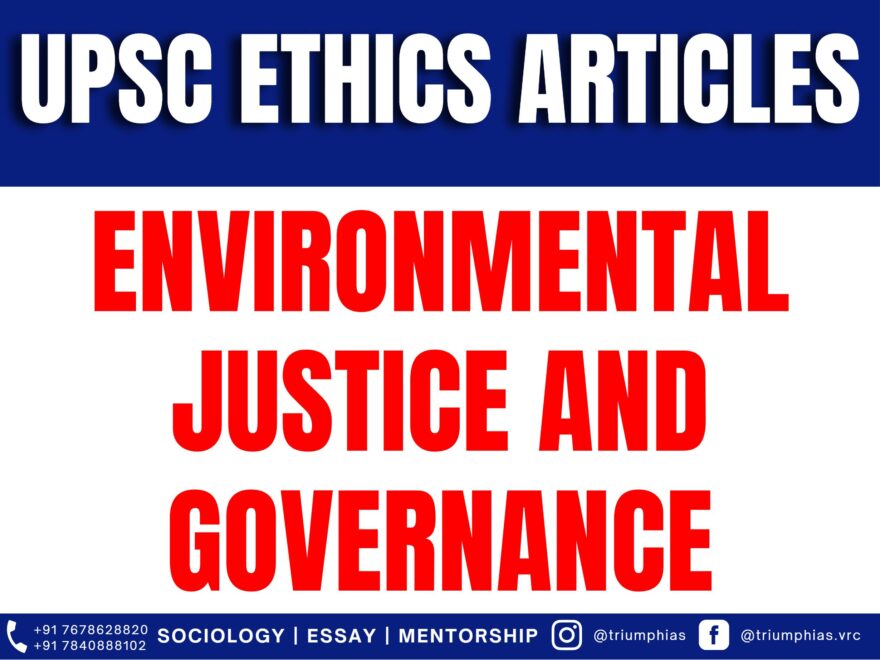Environmental Justice and Governance
This concept originated in the early 1980s in the United States. It has two distinct applications, with the more common usage referring to a social movement that focuses on ensuring equitable distribution of environmental benefits and burdens. The other application pertains to an interdisciplinary body of social science literature encompassing environmental justice theories, environmental laws and their enforcement, environmental policy and planning, sustainable development and governance, as well as political ecology.

Human beings face numerous ethical decisions concerning the environment. One recent example that comes to mind as I write this book is the October 2018 Supreme Court judgment, which directed the use of only Green Crackers during Diwali and specified a two-hour time frame for their burning. However, this judgment also raised ethical questions related to secularism and employment opportunities in the cracker manufacturing industry.
One can also question the feasibility of the Supreme Court’s directive in terms of the limited timeframe allocated. Conventional cracker manufacturing units cannot simply transition into producing Green Crackers just before Diwali, especially when they have already sold their stock to wholesalers and retailers.
Additionally, who determined that these so-called Green Crackers are less harmful compared to conventional ones? Non-compliance with the Supreme Court’s directive carried penalties, which raises the question of whether a limited civil police force can effectively enforce such a directive. One can also question the appropriateness of penal provisions for such an “offense.” What about the rights of individuals who associate the burning of crackers with their religious beliefs?
These topics have gained significant importance worldwide, including in India. India holds the unfortunate distinction of having more environmental conflicts than any other country, as reported by the Environmental Justice Atlas, an international database. Currently, the atlas lists 271 cases in India, surpassing the second-worst nation, Colombia, with 128 cases. A quick glance at the conflicts reveals a close relationship between business and political interests, supported by a complacent administration.
For example, how else can one explain the continued operation of numerous Coca-Cola bottling plants despite widespread opposition from local communities in places ranging from Uttarakhand and Uttar Pradesh in the north to Pallakad (Kerala) in the south? The global soda conglomerate has faced repeated accusations of exploiting local water resources, depleting groundwater levels, and contaminating the soil. While protests have led to the closure of a few plants, many others continue to operate without the company taking significant steps to address the environmental damage it causes.

Regrettably, there are hundreds of such instances of abuse, and only a handful receive attention, typically when the local community raises its voice in protest. Some view these conflicts as a clash between development and the environment, but this narrative is a fallacy. There is ample evidence that economic prosperity does not necessarily lead to environmental degradation.
In fact, a few opinion makers have audaciously claimed that these conflicts hinder the ease of doing business in the country. However, such a narrow perspective overlooks the fact that business growth and rapid industrialization are meant to improve the lives of the people. If the well-being and happiness of citizens are compromised, and their natural surroundings are polluted merely to fill the state coffers and benefit big businesses, such growth becomes meaningless for society.
Authorities have attempted to address environmental concerns by enacting more stringent laws to conserve natural resources, limit the environmental impact of industrialization, and provide compensation to those affected by so-called development. Unfortunately, it is a bitter truth that lawmaking in India often creates loopholes that allow authorities and businesses to bypass regulations and, in some cases, evade accountability for their actions.
This is evident from India’s ranking of 177 out of 180 nations on the Environmental Performance Index-2018, a significant drop from 141 in 2016, according to the biennial report by Yale and Columbia universities in collaboration with the World Economic Forum. The country fares poorly in environmental health and ranks as the third-worst in the world for air quality.
Researchers consistently find that environmental governance in India is weak not due to inadequate laws but rather due to their dismal implementation, particularly because the existing framework does not facilitate meaningful public participation, resulting in imprudent management of resources. Experts, such as A. Damodaran from the Indian Institute of Science, have long argued for a multi-layered environmental governance system based on locally devised and implemented plans that blend conservation goals with sustainable development, rather than relying on centrally designed rules that assume a one-size-fits-all approach.
In a situation where environmental governance has clearly failed, the judiciary has stepped in to fill the gap. The courts have frequently advocated for environmental causes and shown greater sympathy towards community concerns compared to the administration. However, they face a daunting task ahead. An analysis in the State of India’s Environment-2018, released by the Centre for Science and Environment on World Environment Day, revealed that there were 21,145 pending environmental cases awaiting trial in 2016.
Until environmental justice is effectively delivered, one thing remains clear: public opinion demands an end to the killing of environmental protesters.
To master these intricacies and fare well in the Sociology Optional Syllabus, aspiring sociologists might benefit from guidance by the Best Sociology Optional Teacher and participation in the Best Sociology Optional Coaching. These avenues provide comprehensive assistance, ensuring a solid understanding of sociology’s diverse methodologies and techniques.
environmental justice, environmental governance, equitable distribution, environmental benefits, environmental burdens, environmental conflicts, environmental concerns, sustainable development, environmental laws, public participation, environmental performance, environmental protesters, Best Sociology Optional Teacher, Best Sociology Optional Coaching, Sociology Optional Syllabus

